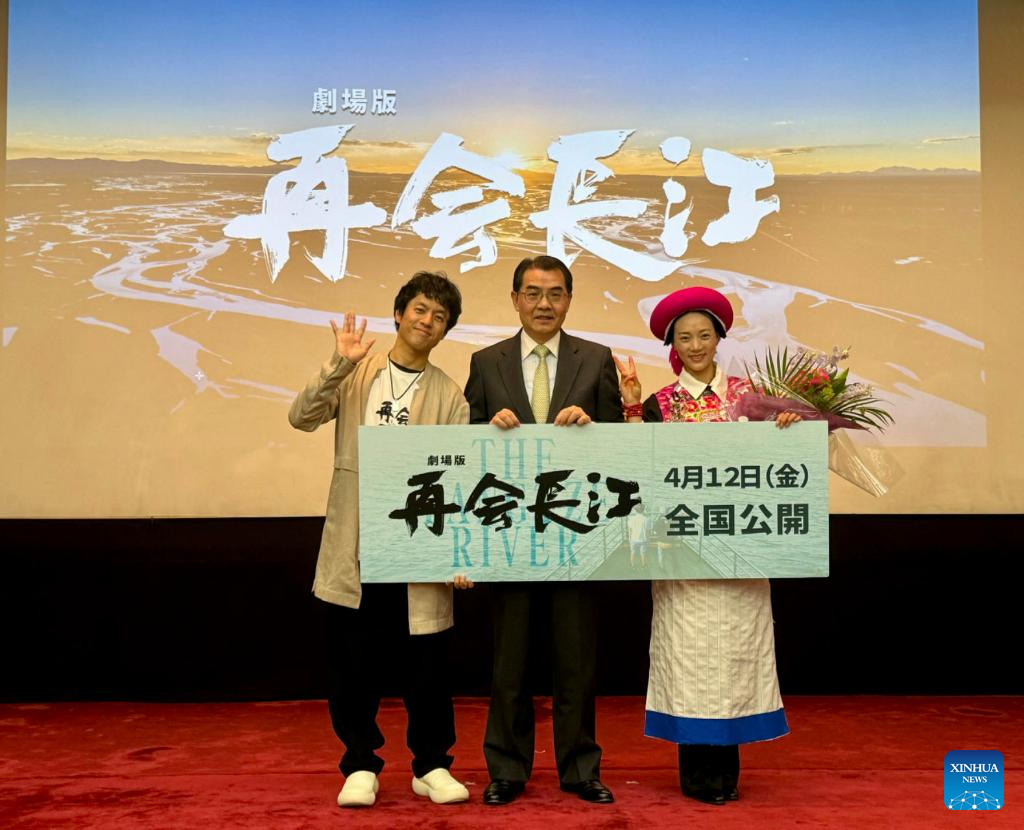Feature: Japanese director hopes to show real China to more Japanese people

Chinese Ambassador to Japan Wu Jianghao (C), Japanese director Ryo Takeuchi (L) and Rinchen Cimu, the Tibetan female protagonist in Takeuchi's documentary "The Yangtze River," pose for a group photo at the Chinese embassy in Tokyo, Japan, April 7, 2024.(Xinhua/Guo Dan)
TOKYO, April 9 (Xinhua) -- "I cannot believe the Tibetan girl who took a photo with a lamb 10 years ago started her own business a decade later." That was a comment from one of the over 100 Japanese viewers deeply touched by the theatrical version of Japanese director Ryo Takeuchi's documentary "The Yangtze River."
The documentary, spanning a decade, offers a moving and vivid portrayal of China's profound transformation, resonating with the audience who witnessed the significant changes along the Yangtze River.
In May 2023, Takeuchi's documentary "The Yangtze River," alongside "100 Faces of Huawei," was screened for a week at a theater in Tokyo's Yurakucho business district. A year later, the adapted theatrical version of "The Yangtze River" premiered in Japan on Sunday at the Chinese embassy.
Takeuchi, in this documentary film, takes the audience on a journey starting from Shanghai, tracing the course of the Yangtze River, and capturing the evolution of life along its banks over the past decade, showcasing China's rapid development.
Following its premiere, the film will be simultaneously screened across various regions in Japan starting from Friday, including Kanagawa, Osaka, Nagoya, Sendai, and Fukuoka.
"This is likely the first documentary showcasing the real China to be screened simultaneously in theaters across Japan," remarked the director when engaging with the audience after the premiere was held.
Wu Jianghao, the Chinese ambassador to Japan, praised the film: "It is a profoundly engaging documentary suitable for all ages. We hope more Japanese people will have the opportunity to watch it."
During the premiere, Takeuchi surprised the audience by inviting Rinchen Cimu, the Tibetan female protagonist whose life underwent remarkable changes as depicted in the film, to join them. Cimu, dressed in traditional Tibetan attire identical to her portrayal in the documentary, elicited astonished reactions from the audience.
"Last December, a high-speed railway was inaugurated in my hometown of Shangri-La, making it more accessible for everyone," Cimu shared at the premiere.
Her words astonished not only the audience but also Takeuchi himself. "When I was filming 'The Yangtze River,' I had to drive for over 10 hours to get to Shangri-La, but now there's the high-speed rail. That's the speed of China!" he said.
Noting the challenges of promoting a documentary that is not necessarily profitable in theaters across Japan, Takeuchi expressed his gratitude to the Chinese community in Japan and Japanese friends who understand China, stating, "With everyone's support, we not only managed to raise nearly double the target funds for promotion but also saw many theaters fully booked for screenings."
Reflecting on his initial intentions for nationwide promotion, Takeuchi said, "I sincerely hope that Japanese people who are less familiar with China, as well as second-generation Chinese children born and raised in Japan, will come to watch this film because it showcases the real China."
The director launched a project called "Yangtze Coffee" by renting a prominent space at the entrance of Yokohama Chinatown starting last Friday, serving as a promotional exhibition hall for the film. Here, visitors can not only enjoy free coffee but also watch behind-the-scenes footage of the documentary and explore cultural exhibits from the Yangtze River basin, immersing themselves in the essence of Chinese culture.
Zhang Yansong, the principal of Yokohama Yamate Chinese School, told Xinhua at the premiere that he intended to have over 900 students and teachers at the school watch the film together.
"I believe that through this documentary, not only can children understand China's rapid development, but they can also draw inspiration from characters like Cimu, and develop aspirations for life," he noted. ■